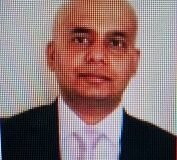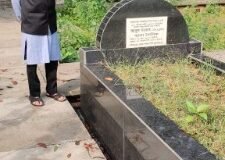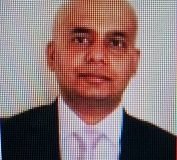 BY SHABBIR AHMED :: The students of history of South Asia know it too well that the partition of India into two nations did not bode well for us, the inhabitants of the then East Pakistan.Punjabi clique ruled our motherland for a long time and that includes the military and the communal forces of Pakistan. These Islam-based communal forces tried to suppress the secular political and cultural tradition of our ancestral homeland. To implement their sectarian Islamic Ummaism, the communal ruling class of Pakistan denied the right of the Bengalis to use their language in the state of Pakistan. Even the communal ruling class tried to ban and restrict the cultural activities of our people. Most of the non-communal political and intellectual forces of erstwhile East Pakistan were frustrated under the rule of the communal system of Pakistan.
BY SHABBIR AHMED :: The students of history of South Asia know it too well that the partition of India into two nations did not bode well for us, the inhabitants of the then East Pakistan.Punjabi clique ruled our motherland for a long time and that includes the military and the communal forces of Pakistan. These Islam-based communal forces tried to suppress the secular political and cultural tradition of our ancestral homeland. To implement their sectarian Islamic Ummaism, the communal ruling class of Pakistan denied the right of the Bengalis to use their language in the state of Pakistan. Even the communal ruling class tried to ban and restrict the cultural activities of our people. Most of the non-communal political and intellectual forces of erstwhile East Pakistan were frustrated under the rule of the communal system of Pakistan.
At that time, Bongobondhu Sheikh Mujibur Rahman organized the secular and non-communal intellectuals and other social forces of our motherland to stand against the military and their allied fundamentalist “Muslim Leaguers” of Pakistan. He received a full support (except a few pro-Pakistani collaborators) for the political and cultural freedom of the Bengalis. He continued his relentless struggle and suffered for a long time in the jails of Pakistan.
It was possible for a towering and charismatic leader like Bongobondhu Sheikh Mujibur Rahman to unite our people against the communal ruling classes of Pakistan, who were using Islam at all levels to keep our motherland under their Ummatic system. Bongobondhu was a believer in Islam but opposed to the use of Islam in politics. That is precisely why the first parliament in Bangladesh wrote the constitution that banned all the Islamic political parties. Bongobondhu had this farsightedness to realize that the aspirations of Bengalis could never be met by the religious traders who kowtowed the ruling Punjabi clique from the then West Pakistan.
Unfortunately, after Bangladesh’s independence the banning of the communal politics using Islam did not prevent the pro-Islamic political goons from continuing destructive politics by joining hands with many other extremists. Most of the cadres of the Islamic parties went underground. At the same time, the Maoists/communists formed underground political parties with armed cadres to carry on armed revolution inside our motherland.
In the aftermath of the independence of Bangladesh, all these underground extremists created a terrible condition in the newly born republic. Even the ultra-leftists formed political parties and their armed wings (such as Gonobahini) to implement “scientific socialism,” a term not quite clear even to the proponents. To protect the country and its independence, Bongobondhu took a temporary measure to unite all the pro-liberation forces of our motherland under Bangladesh Krishak Sramik Awami League (BKSAL).
Unfortunately, he along with most of the members of his family was murdered before he could implement the programs under BKSAL. In the wake of the independence of Bangladesh, there was a need for bringing stability in the country before allowing free-will politics. However, Bongobondhu was a leader who believed in multi-party political system. That is why, immediately after the independence he allowed political activities of all parties except the Islamic parties that performed genocide and spread communalism in Bangladesh under the occupation of Pakistani army for nine long months in 1971.
At a later stage, it was necessary to go for a restricted democracy due to the extremists of the armed wings of the communists and the defeated Islamic forces. But disregarding the restricted democracy under BKSAL, one would find pragmatism for the development of the future of Bangladesh under the leadership of Bongobondhu. The administrative reforms that were supposed to take place under BKSAL would have brought significant effects on the condition of Bangladesh.
All the districts were supposed to be getting autonomy under a representative executive body headed by the governor. Under this system, most of the development programs could have been implemented directly by the district administration. The bureaucratic system under the secretariat was supposed to be cut down to a minimum level. The central ministry was supposed to be mostly providing funds to the districts. The agricultural reforms could have brought self-sufficiency in food a long time ago. It was planned to cultivate under cooperatives where the government would provide modern equipments and other resources. According to the plan, the owner, the government (for providing resources), and the laborer (for providing labor) would get the share of the
production. A massive plan was undertaken to bring all the lands (including the ones that are not
cultivated by the owner) under cultivation.
Unfortunately, Bongobondhu was not able to materialize his vision of reforms especially in administration and agriculture because of his assassination by a few disgruntled army officers. It is noteworthy that the disgruntled army officers first declared Bangladesh an Islamic republic after the assassination of Bongobondhu. The Wahhabi hate kingdom “Saudi Arabia” and their partner Pakistan recognized Bangladesh only after the death of our great leader Bongobondhu Sheikh Mujibur Rahman.
Many researchers in Bangladesh and abroad wrote on the life and politics of Bongobondhu. Of them, Dr. Habibur Rahman, wrote his Ph.D. dissertation on “Sheikh Mujibur Rahman and the Independence of Bangladesh” in 1989. Based on his Ph.D. research, Dr. Rahman later wrote a book titled “Bangladesher Obvhuddhoy O Sheikh Mujib (Rise of Bangladesh and Sheikh Mujib)” in 1991 (City Press and Publishers, Dhaka, Bangladesh). In the preface, Dr. Emaj Uddin Ahmed (a former vice chancellor of Dhaka University) wrote on Bongobondhu as “a leader ever memorable like Mahatma Gandhi, Sukornao, Kamal Pasha, et al.”
In this book, Dr. Rahman wrote elaborately and neutrally like a researcher on the rule under Pakistan and the political programs and organization under the leadership of Bonbondhu Sheikh Mujibur Rahman. Especially, he wrote about the difficulties encountered by the government under Bongobondhu in the post-war Bangladesh. He mentioned about the destructive activities of the opportunists in his own party and the extremists belonging to the armed wings of different underground political parties. Despite the failures in controlling the chaotic condition in the post-war Bangladesh, Dr. Rahman wrote about some far reaching successes of the government. In particular, he highlighted the decision of the government in taking over the financial responsibilities of all the primary schools in the villages and tax exemption for the poor farmers (up to 25 bighas of land).
We can come to know from his research that the government for the first time provided forty thousand power pumps, ten thousand shallow pumps, and three thousand deep pumps to the farmers of Bangladesh. Dr. Rahman elaborately mentioned about the programs (under BKSAL) taken by then government a bit early to eradicate poverty and hunger through massive cooperative programs in the agro-based areas in the villages throughout Bangladesh.
Those who observed Bongobondhu closely and studied his policies and rule, gives overall positive high marks for his sincerity to eradicate poverty and communal Islamic politics from the soil of Bangladesh. It is a tragedy that the people of Bangladesh lost such a great leader only after three and half years of the independence of Bangladesh. All the Bengalis regard him as the founder and the father of the nation of Bangladesh except a few followers of the military rulers and the followers of the political Mullahs who were our Fifth Columnists.
The descendants of the communal forces ideologically attached to the Mullah-Military alliance of Pakistan and Bangladesh try to create controversy on Bongobondhu. In fact, their followers are now in the catbird seat of power. They are the ones who are re-writing the textbooks to inject confusion amongst the future generations of Bangladesh. But, they won’t be able to succeed because it is the “truth” that ultimately will prevail.
Bongobondhu’s contribution for Bengalis will remain afresh in the minds of millions of people. It is a small wonder that in a BBC survey he was voted as number one Bengali to set foot in this mortal world.
The writer , a researcher and commentator, writes from Jacksonville, Florida, USA. He can be reached at
shabbirahmed2000@yahoo.com
 Weekly Bangla Mirror | Bangla Mirror, Bangladeshi news in UK, bangla mirror news
Weekly Bangla Mirror | Bangla Mirror, Bangladeshi news in UK, bangla mirror news





